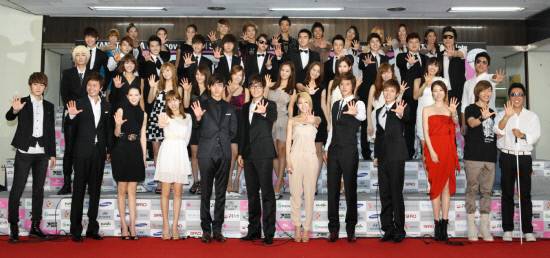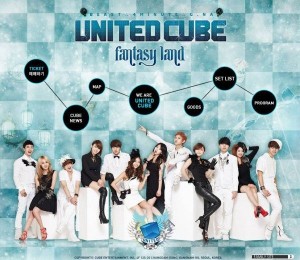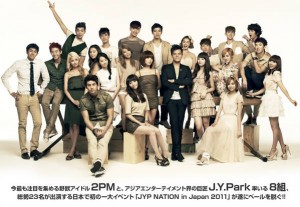
On October 23rd, 2011 Madison Square Garden will be invaded by the SM Town family and thousands of their most avid fans. Several days ago, SM confirmed that it will indeed be holding an “SM Town Live World Tour Concert” in New York in front of an estimated 15,000 people crowd in one of the biggest venues in American music. SM certainly is taking huge strides in bringing attention to Kpop and their artists and in some sense ought to be applauded.
Recently, major companies in Kpop have been following the footsteps of SM by launching their own family brand, nicknamed JYP Nation and United Cube. This is the chance for these big names to trot out their entire stable of artists for show, showing a united front for fans and the media. At first, these collaborations and joint concerts were entertaining and was a great gift to fans, however, over time it seems that the benefits lie only with the companies.
SM started family concert back in 1999 with a Christmas album featuring all their artists and since then has released a single or album for every summer. Starting in 2007, it has held SM Town concerts in Korea and in recent years in Japan, Thailand, the US, and most recently France.
JYP joined in the fun last winter with the release of This Christmas by its resident idols including 2PM, 2AM, Wonder Girls, Miss A, and Joo. They followed up with JYP Nation concerts in Korea and Japan (and hoping to spread to the rest of Asia). In the spring, Cube Entertainment announced the preparation of a United Cube concert featuring their popular acts B2ST, 4minute, G.NA, and rookies A Pink; similar to SM and JYP, Cube also released a single Fly So High as part of promotions. In the next several months, Cube is hoping to spread its concert to Europe and possibly South America and Africa.
 From one perspective, these efforts for companies yield benefits for all parties involved – fans, artists, and the companies themselves. The artists get concert-level exposure for less work while having fun with fellow family members and the fans. Often times for rookie groups, being able to perform with their more popular sunbaes will introduce them to a public who have not yet taken notice. And sometimes even the boss gets to perform (i.e: Mr. JYP). Fans who enjoy multiple groups from the same company get to see all their favorites for a decent price. And of course the companies make profit, from ticket and album sales to promotional t-shirts, posters, and the like. Most importantly, in bringing these concerts worldwide, the companies are helping to spread Kpop to a greater audience including the American market, an arena in which Kpop has not yet seen much success.
From one perspective, these efforts for companies yield benefits for all parties involved – fans, artists, and the companies themselves. The artists get concert-level exposure for less work while having fun with fellow family members and the fans. Often times for rookie groups, being able to perform with their more popular sunbaes will introduce them to a public who have not yet taken notice. And sometimes even the boss gets to perform (i.e: Mr. JYP). Fans who enjoy multiple groups from the same company get to see all their favorites for a decent price. And of course the companies make profit, from ticket and album sales to promotional t-shirts, posters, and the like. Most importantly, in bringing these concerts worldwide, the companies are helping to spread Kpop to a greater audience including the American market, an arena in which Kpop has not yet seen much success.
On the other hand, the entire process has become another part of this market system where profit for the companies override all. The acts themselves aren’t well-planned and is treated and perceived more like a fan service – a mediocre type at that. The songs lack musical qualities and ends up being bad attempts at squeezing as many voices onto a track as possible.
For artists, these concerts are much more exhausting and time-consuming for they not only have to practice their own routines, they also put in countless hours into joint performances where they maybe get one or two lines of singing and put into choreography where they may not even be seen. And often times, practice for these family concerts take place during promotions/preparations for future albums, increasing the workload on these already overworked idols.
From speaking to close friends who have attended SM Town in LA and JYP Nation concert in Korea, the main complaint from fans is the lack of originality in the joint performances. The most common path involves groups switching up songs/ dances where the guy groups cross-dress and attempt the sexy dance moves while the girls do the opposite. A notable example is when 2PM took on Miss A‘s Good Girl Bad Girl while the girls switched it up with Heartbeats; these performances are far from stellar. Another issue is the lack of passion artists have during joint stages. Artists pour their all into their individual songs but are barely there for the combined stages, which is understandable. However this leaves fans feeling disappointed, angry, and cheated. Despite the supposed united fronts by the artists, these family concerts still are a competition to show fan loyalty and sometimes these fan wars get downright nasty.
In the end, the artists suffer, the fans leave unsatisfied, yet the money keeps filling up the pockets of those higher ups. Seeing promotions for these family concerts, the fan girl in me definitely rejoices yet the critic in me can’t help but sigh at how once again, Kpop is living up to its name as a business, a power/money-hungry industry dominated by greedy people out to cheat fans and artists alike. What are your opinions on these family concerts? Are they really benefiting the ones they should truly be helping – fans and artists – or are they just schemes for money?



